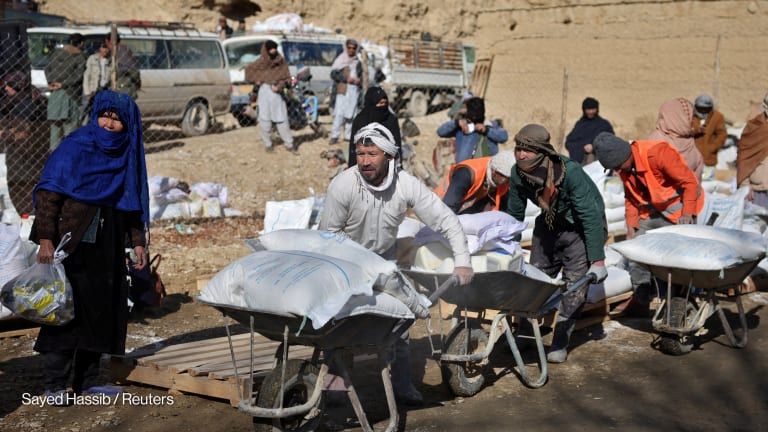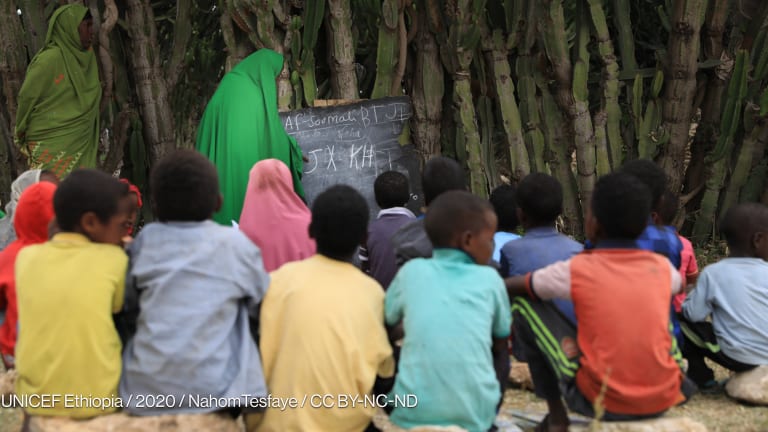
Hosna Jalil will be speaking at Devex World on July 12. Book your tickets to hear her and get a yearlong complimentary Devex Pro subscription.
It was in a furnace room used to heat the Sayed-ul-Shuhada mosque in the Ghazni province of Afghanistan that Hosna Jalil received her education as a young girl in Taliban-run Afghanistan. For two years, beginning when she was seven, Jalil learned in the community-based education program, run by NGOs, in a room with soot-stained walls and firewood stacked high. The children — both boys and girls — worked despite fear of Taliban inspections, and had been taught to hide their textbooks and replace them with religious texts if the militants ever showed up.
“But I can claim that the quality of education was amazing … much better than from 2001 for a few years at the beginning of the [post-Taliban] government,” Jalil, 30, told Devex. “I loved that program,” she said with a hint of nostalgia.
Despite its informality, it was an education that led her from a childhood in Afghanistan’s rural Andar district to a role as the nation’s deputy minister for interior affairs — the first woman to hold that position in the highly masculine security sector. She went on to become deputy minister at the Ministry for Women’s Affairs. But left in June 2021 to study in the United States to further her career in the Ministry of Interior Affairs because she could see her presence made “a difference there.” Jalil was still in the U.S. — where she remains — when, two months later, Kabul fell to the Taliban, something she said “no one really believed” would happen.
“We do feel like we lost another round of the game, but the game is going on. So if we can't contribute tangibly ... we can at least educate the next generation to do what we wanted to do.”
— Hosna Jalil, Afghanistan’s former deputy minister for interior affairsAfghanistan is now in the midst of a humanitarian crisis and the economy is deepening its downward spiral, with 19 million people food insecure and 6.6 million at “emergency levels” according to United Nations Emergency Relief Coordinator Martin Griffiths. He accused the Taliban of “increasingly seeking to play a role in the selection of [aid] beneficiaries and channeling assistance to people on their own priority lists.”
It was Jalil’s covert education — which was able to be converted into formal grades — that she said empowered her, and a generation of other female civil servants who were doing their best to improve Afghanistan before they were largely banned from the workplace by the Taliban takeover. The hard-line Islamists have clamped down on women’s rights and targeted officials of the previous, Western-backed government.
“[Female officials] all believe that if we have been able to be who we are that's because of our education,” said Jalil. “And if we also believe like, hey, my voice really matters, it is only because of that education.”
Despite this sense of empowerment, working while female in the Afghan civil service was not easy. “Sometimes it mentally drained us, it physically made us sick,” said Jalil. “I don't remember any woman that I've worked with who was not depressed at some point in time.” She encountered numerous sexist challenges working her way up through government, blazing a trail for other women before eventually being forced out of the Ministry of Interior Affairs.
But there “was a mentality among all of us … that I am going through these challenges so I can normalize these things, and the next generation … the ones who are going to replace us [are] going to gradually decrease these challenges at the personal level, so the challenges will be more professional and less personal,” said Jalil.
“We all believed in that because we had a vision, we wanted to build Afghanistan with our own hands, and I think that comes with education,” she added.
And what of the education of Afghanistan’s youth now? Jalil feared the Taliban have returned to form, banning girls from schools and turning schools into madrassas, places where the Taliban can go about “training suicide bomb numbers or brainwashing the kids.”
She continued: “I think that's about the worst thing that can ever happen to Afghanistan. I think Afghanistan can tolerate an era where the development is frozen, but cannot tolerate — even if we have gone back — [going] back to an extent where we will have thousands of madrassa across the country.” Education, she said, would help counter radicalization among Afghanistan’s younger generation.
Education “keeps everything alive” continued Jalil. “It develops a generation that can preserve the last 20 years' achievements.” She also said that if education is kept alive in Afghanistan, there will be an “internal change” in the country — perhaps through pressure on the Taliban — though she said she cannot see “a bright near future” and that the current situation held the prospect of a “never-ending humanitarian crisis.”
Still, Jalil did not advocate for armed resistance, saying that could cause another civil war. Not providing aid for fear of legitimizing the Taliban was “not an option” either, according to Jalil, but she suggested their participation could be kept to a minimum by engaging a mix of NGOs, community groups, and the private sector.
But the prospect of long-term development, rather than humanitarian response, requires effective schooling, according to Jalil. “If we want to change things from within ... We need to keep up with education,” she said. She suggested that educated children might also eventually become part of government structures and be able to work for change. To do this, Jalil would like Afghanistan’s youth to receive a 21st-century version of the community-based education program she received, hidden away in the soot-lined room behind that Andar district mosque.
“This is the age of technology and technology makes everything possible,” said Jalil. She added that while it might be expensive, it would be “worth it” and that she wanted Elon Musk’s Starlink internet connection technologies — which have been deployed to help Ukraine’s fight against Russia — to support educating Afghanistan’s children.
Despite her exile in the U.S., Jalil is determined to “leave a better legacy to our next generations than what our previous generations left for us.” She said, “We do feel like we lost another round of the game, but the game is going on. So if we can't contribute tangibly ... we can at least educate the next generation to do what we wanted to do.”
Search for articles
Most Read
- 1
- 2
- 3
- 4
- 5








